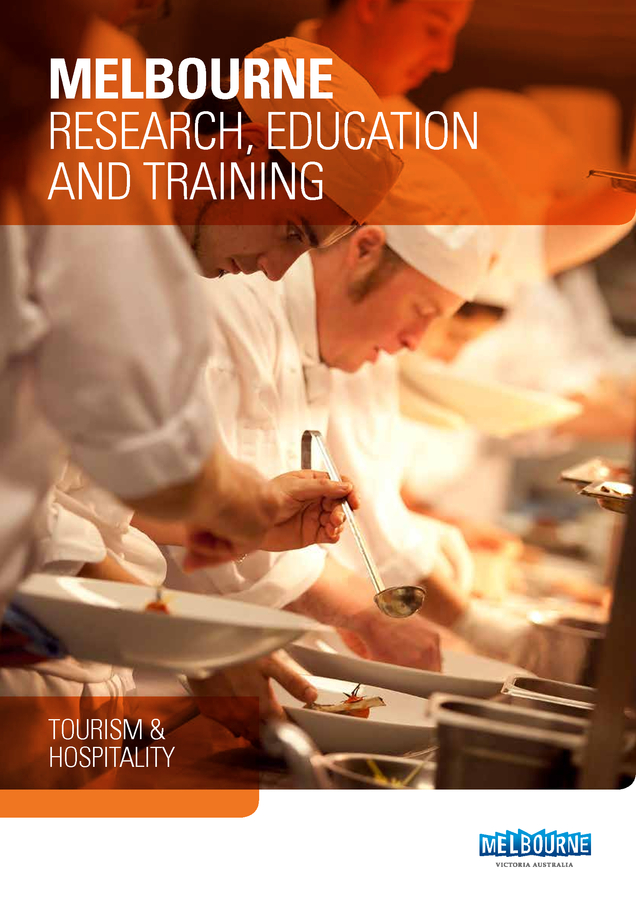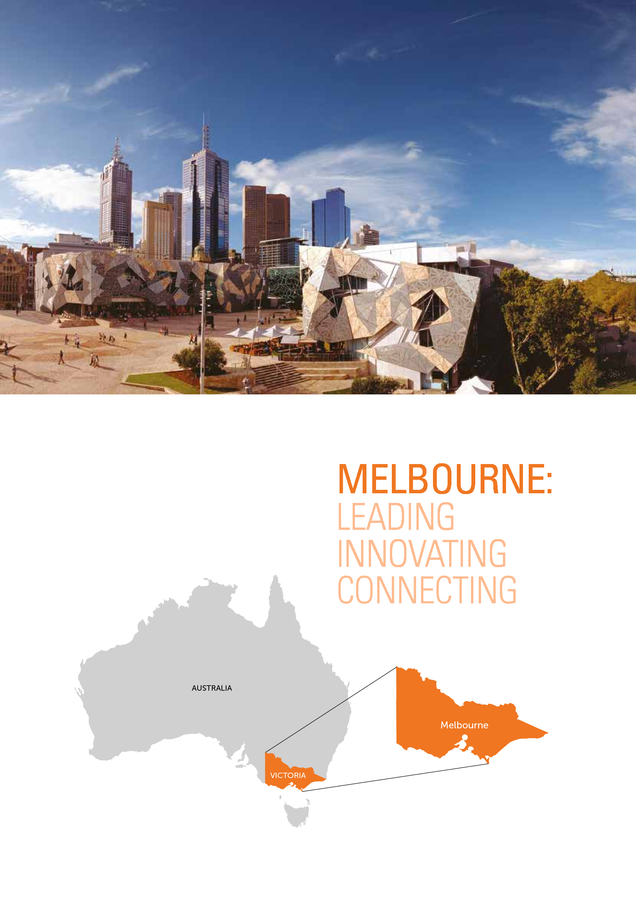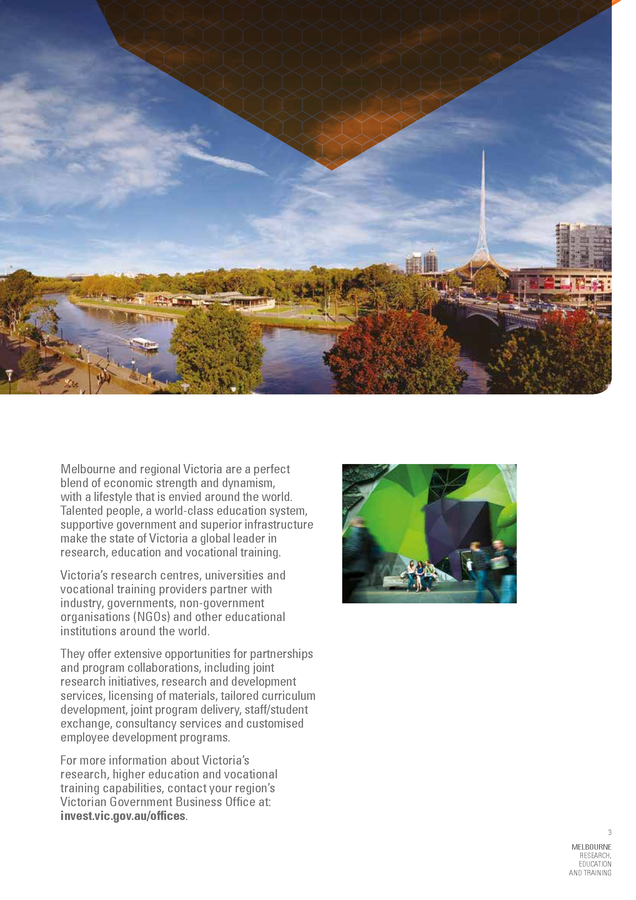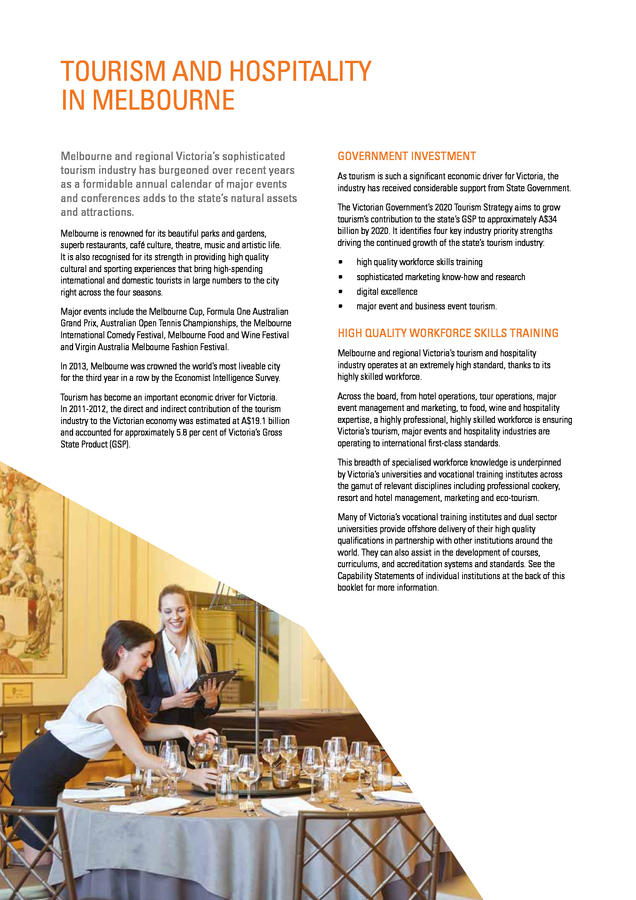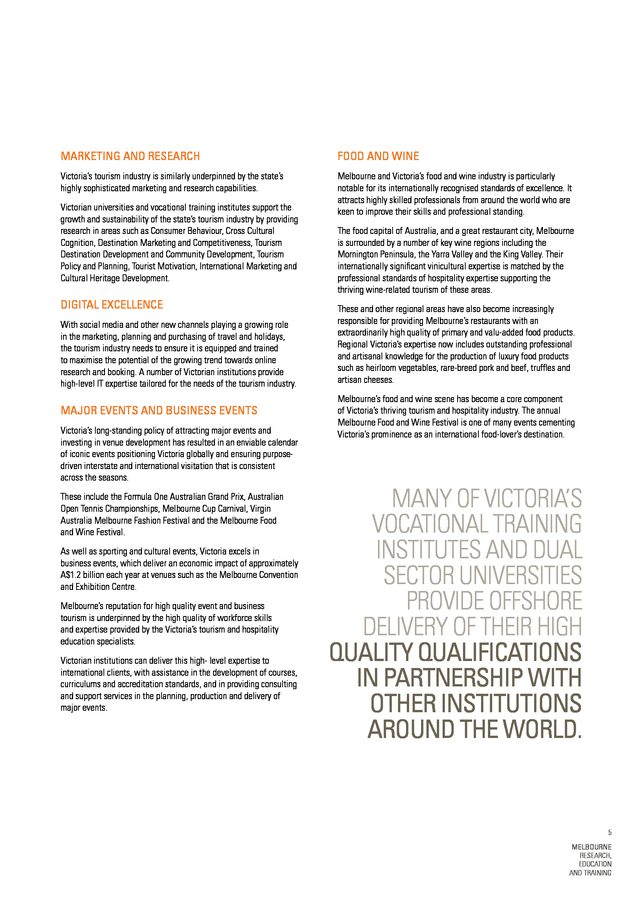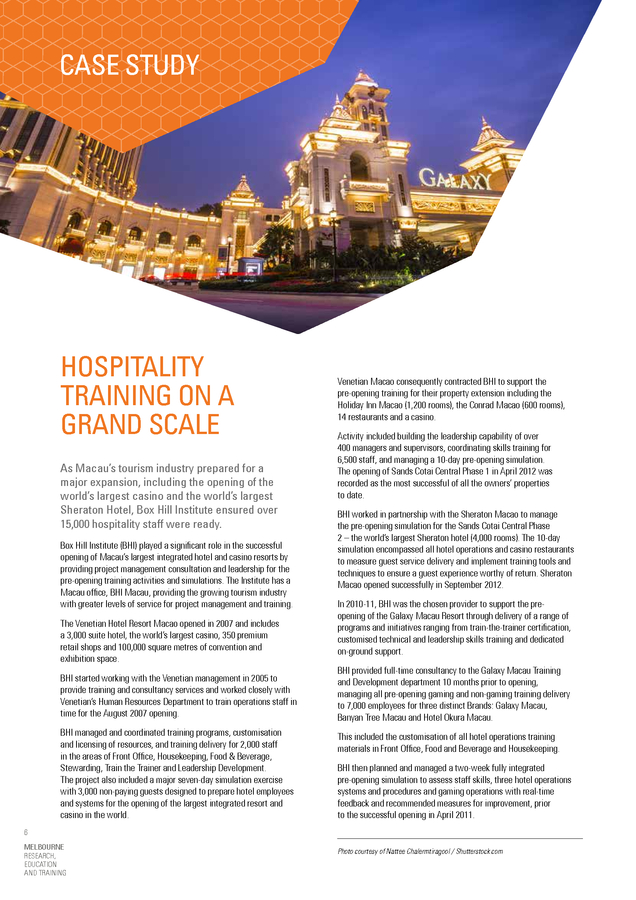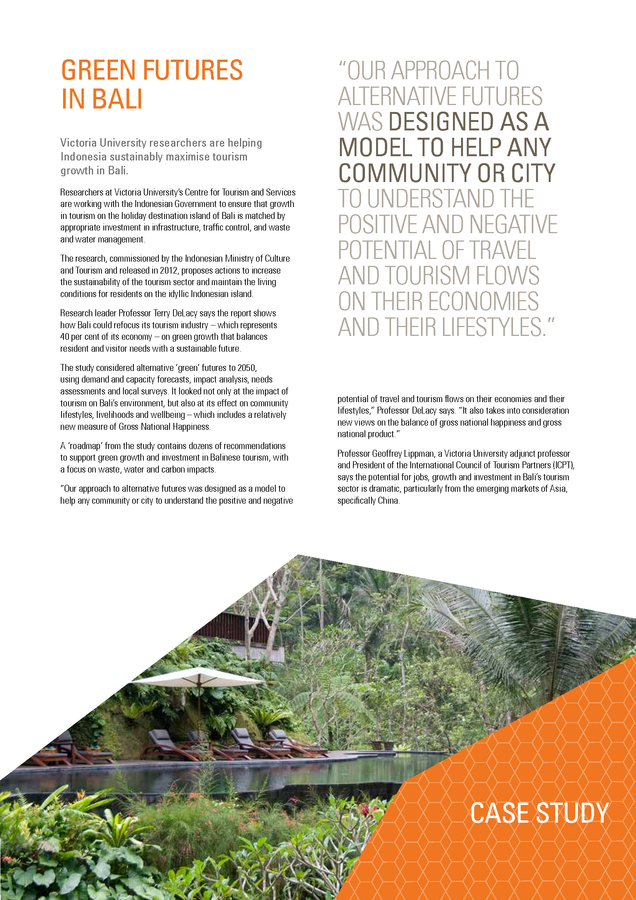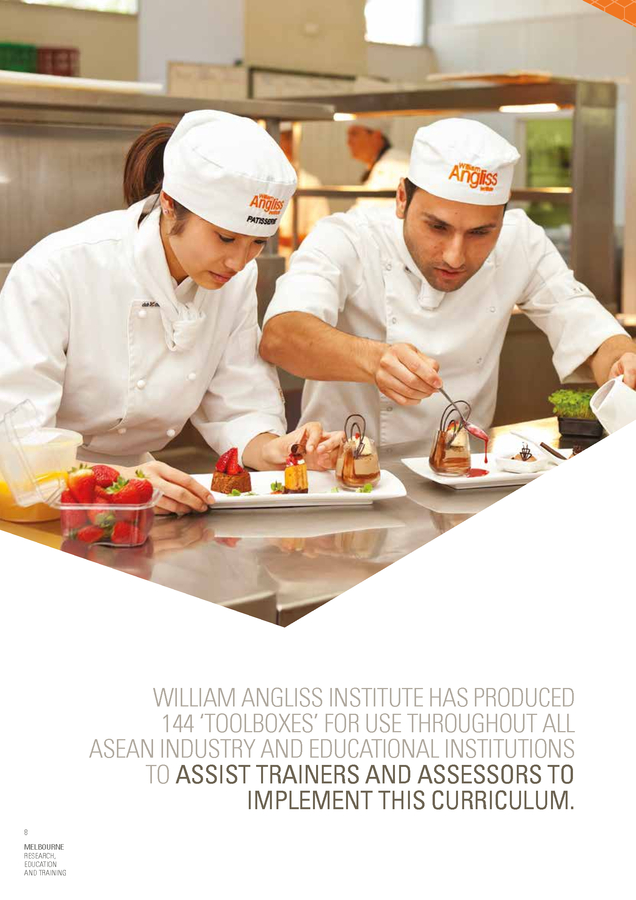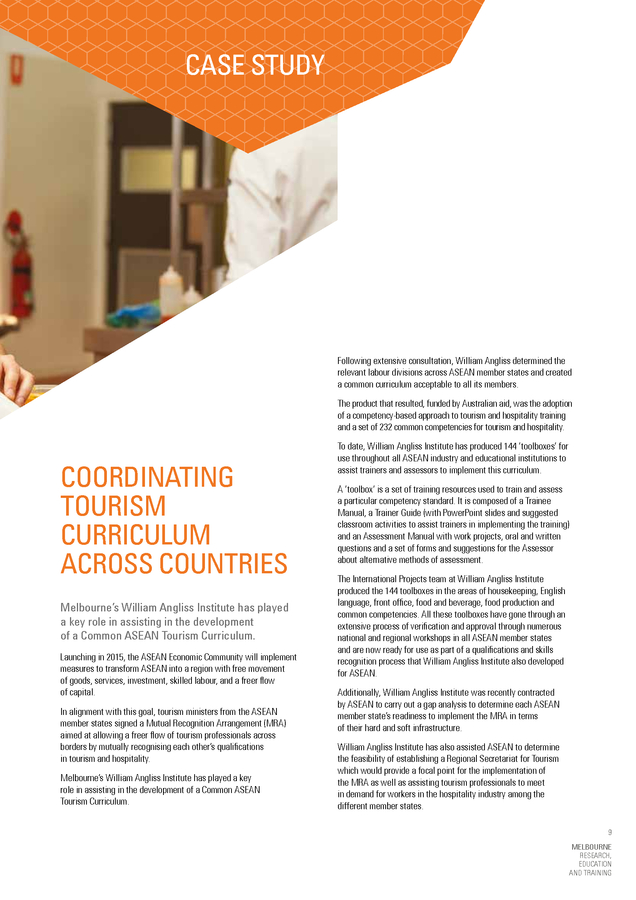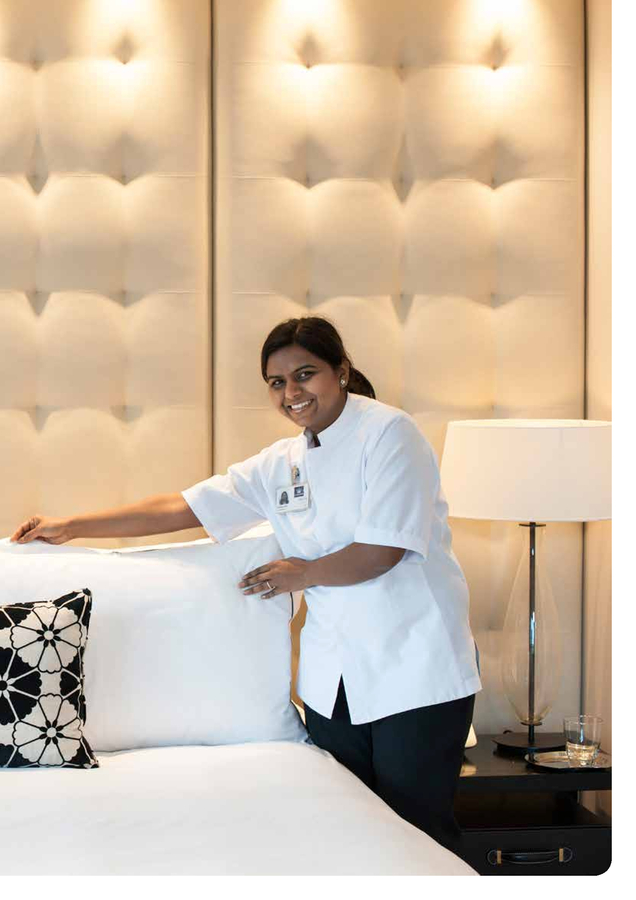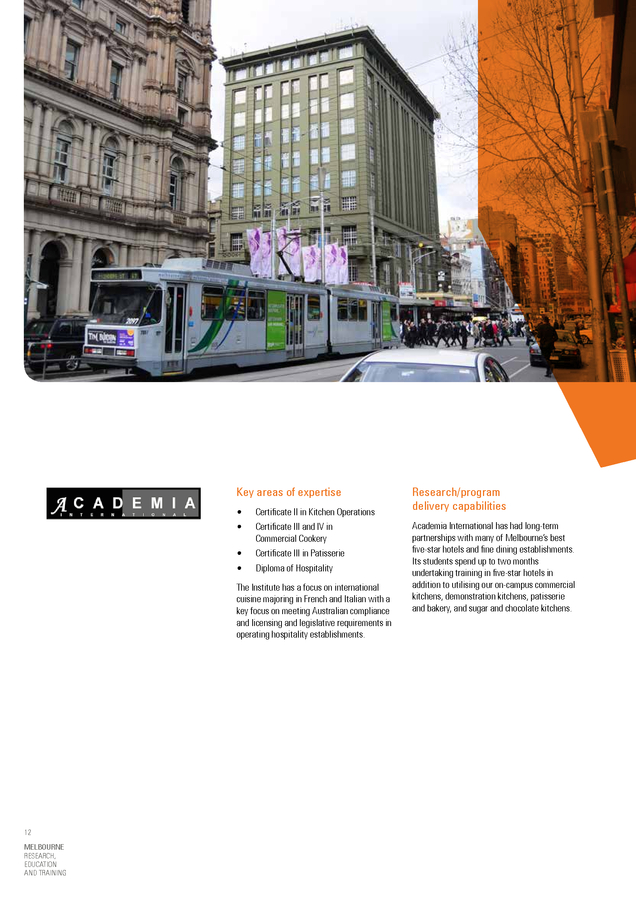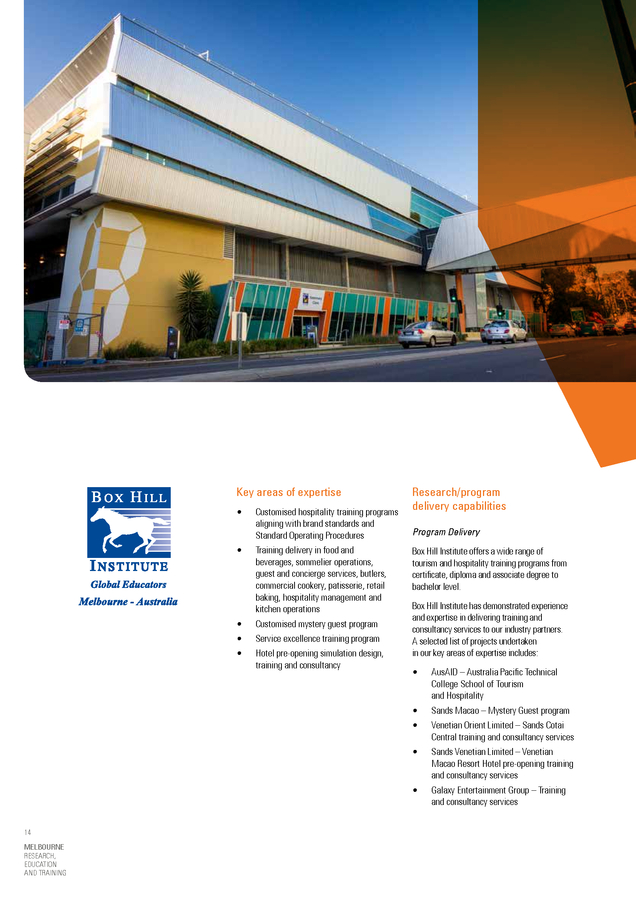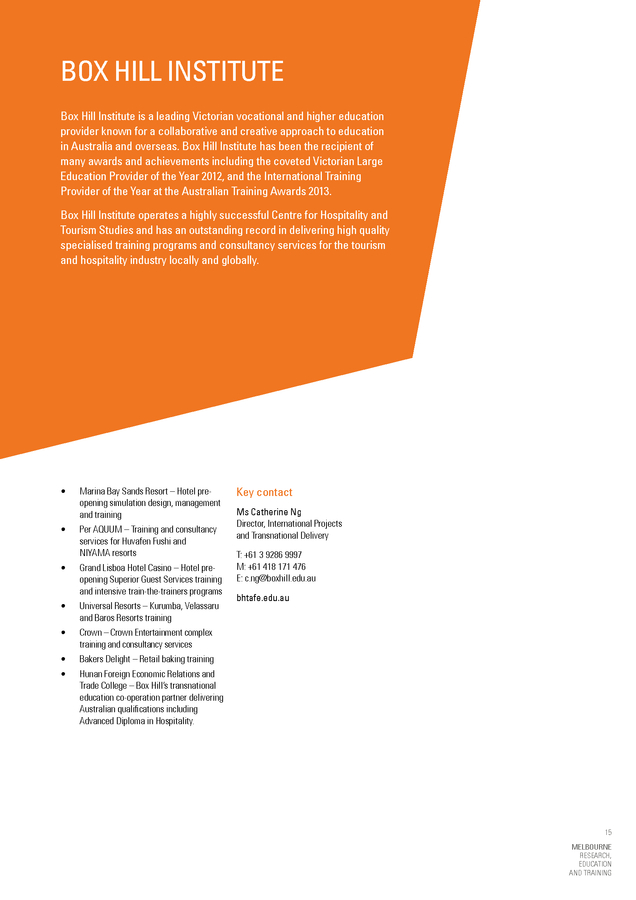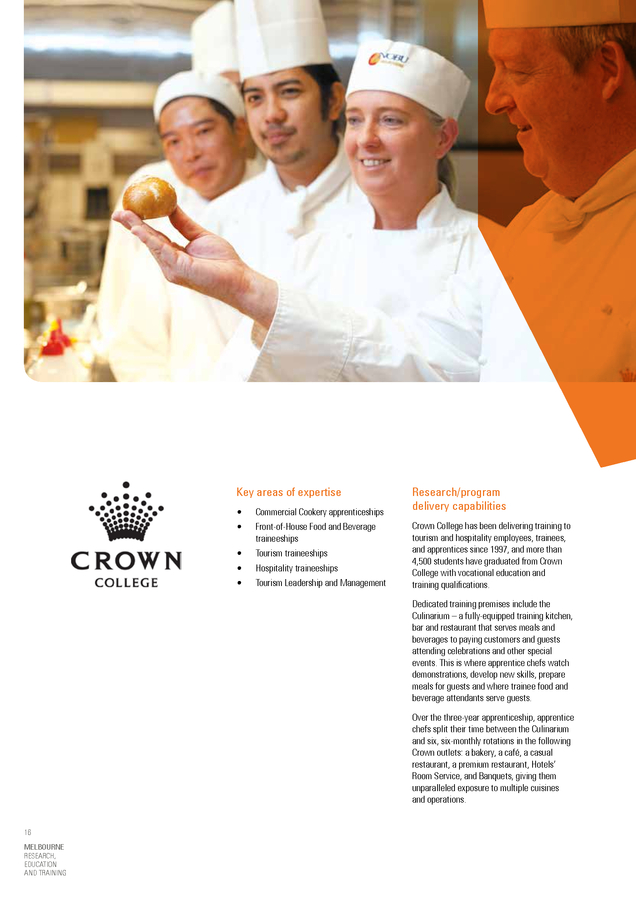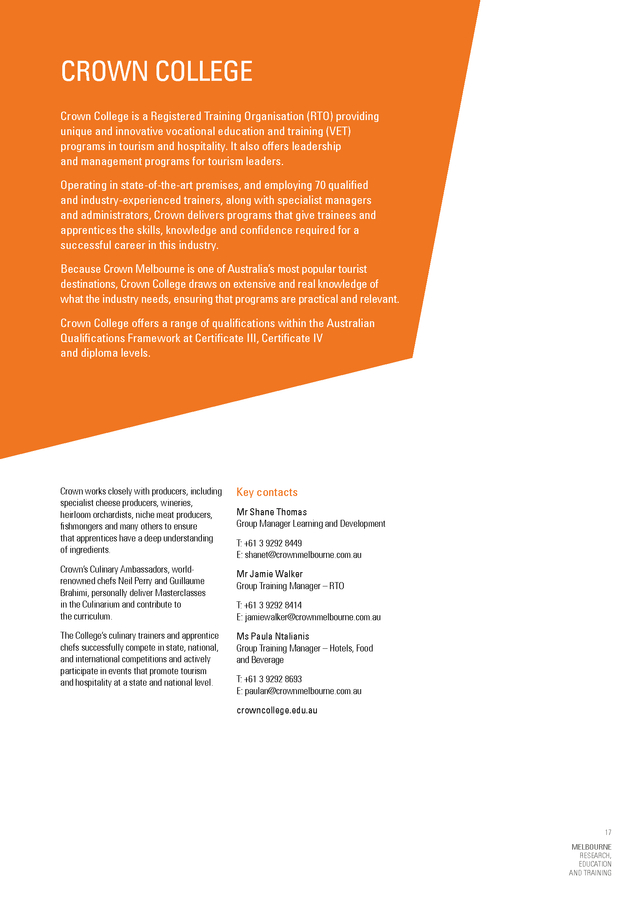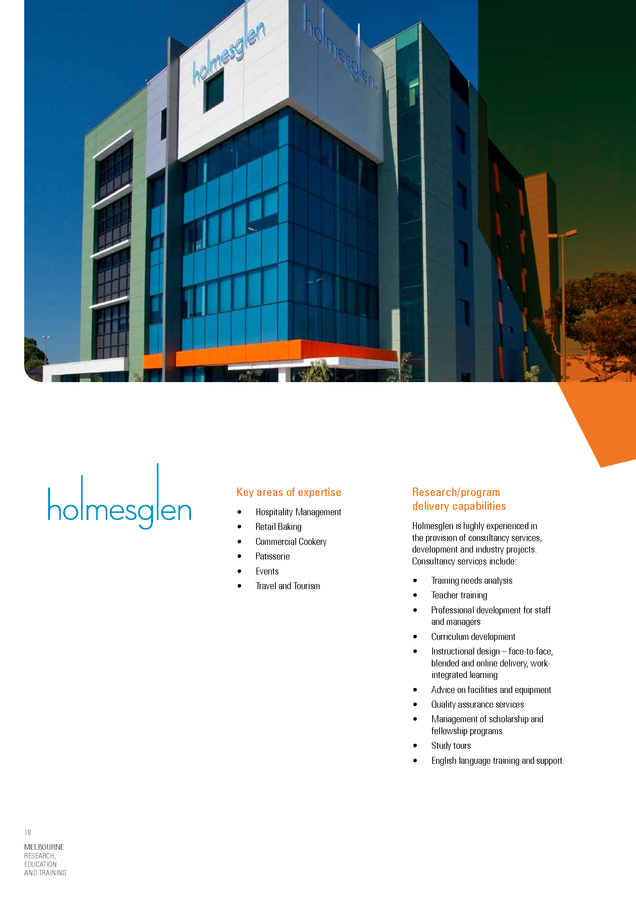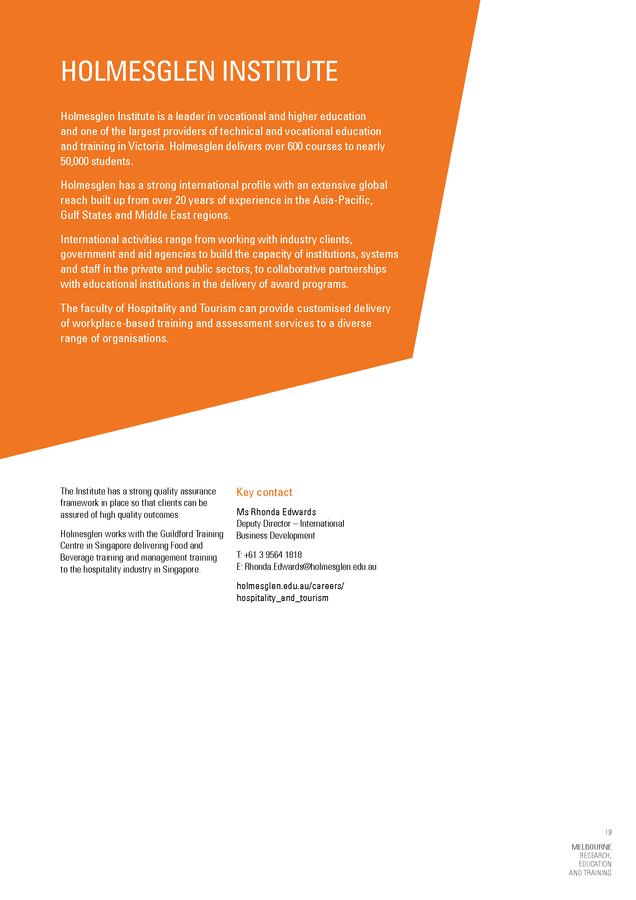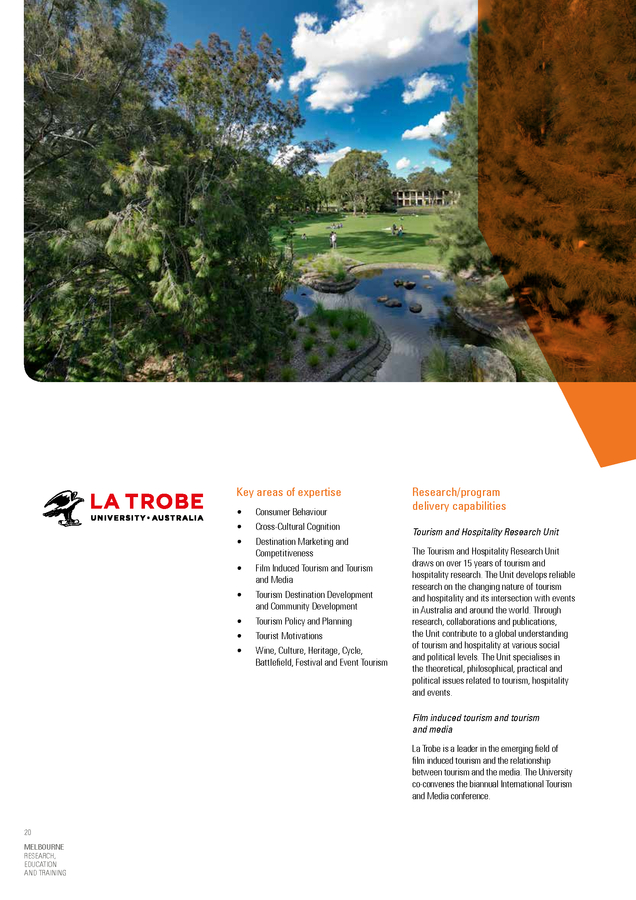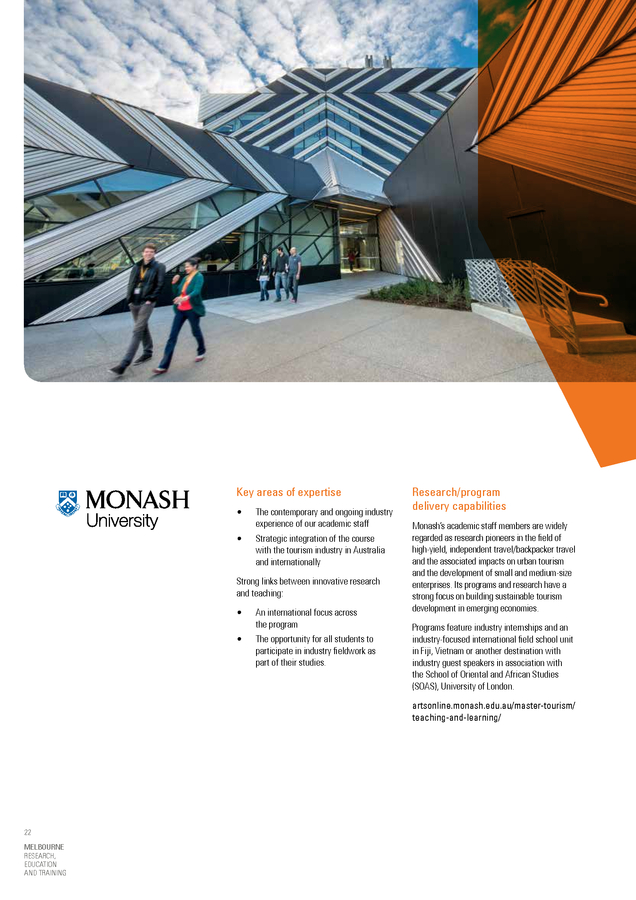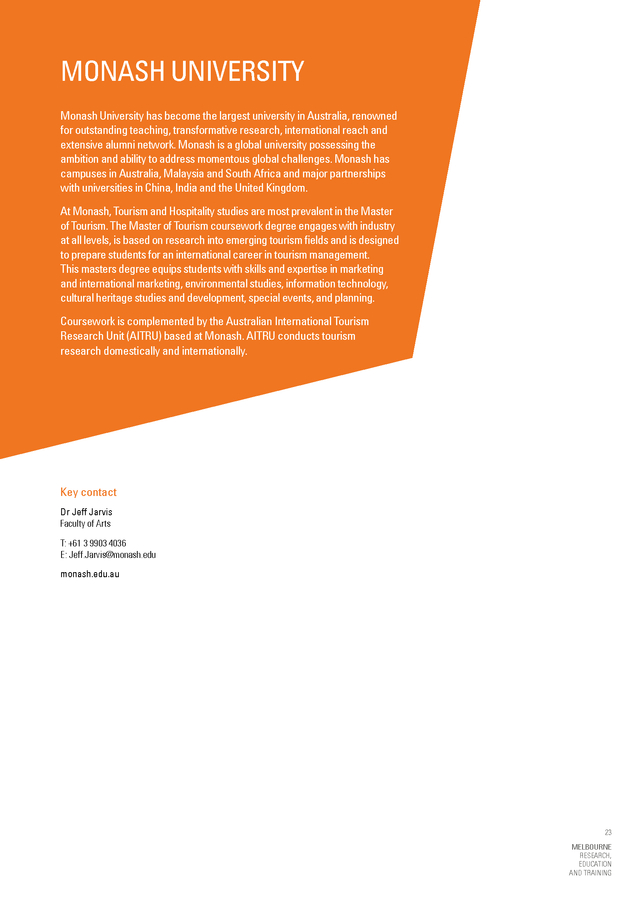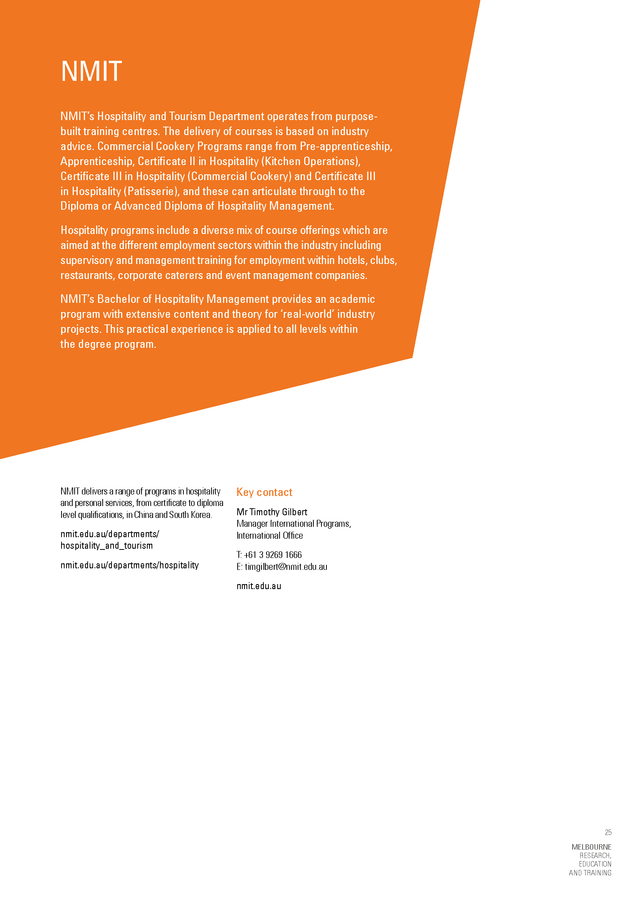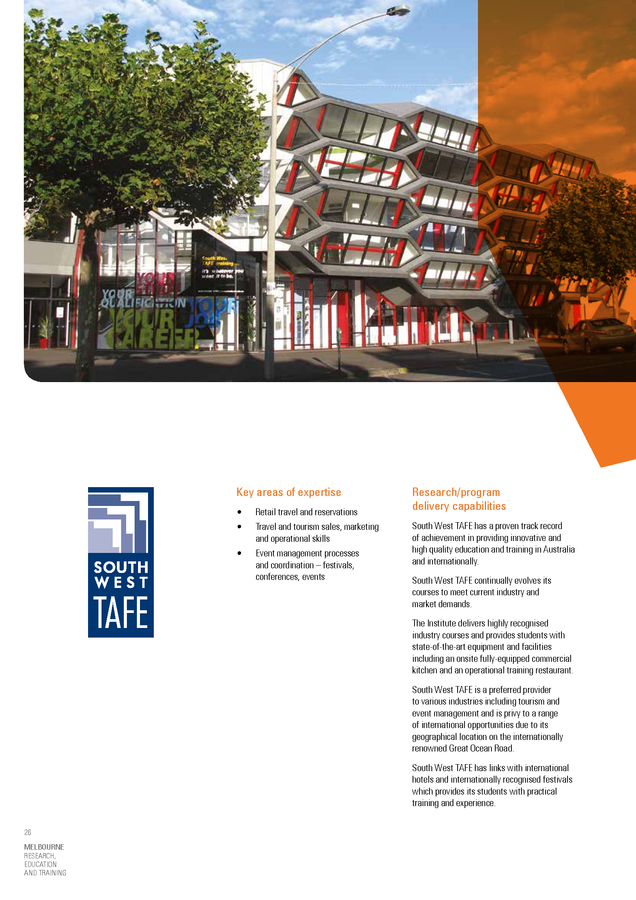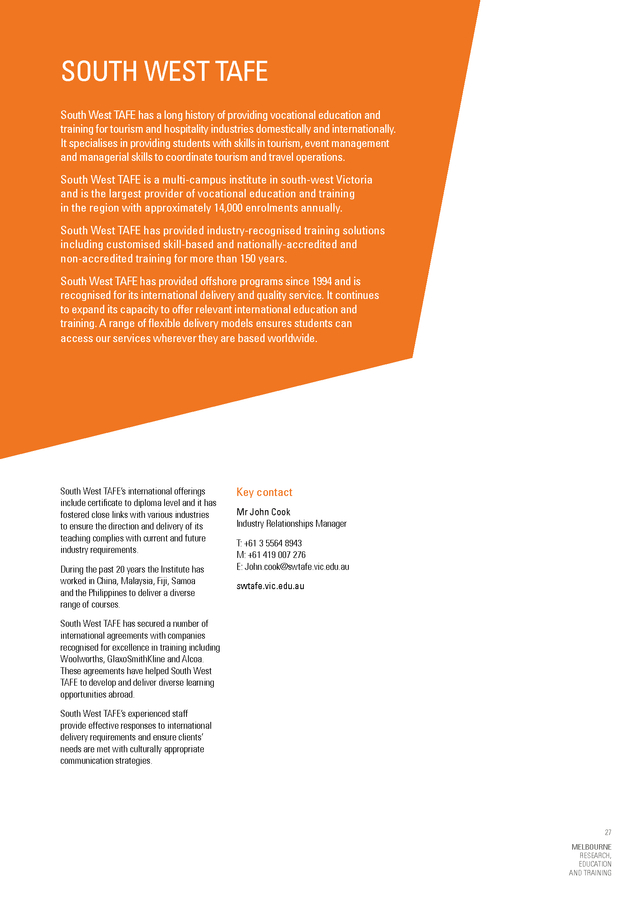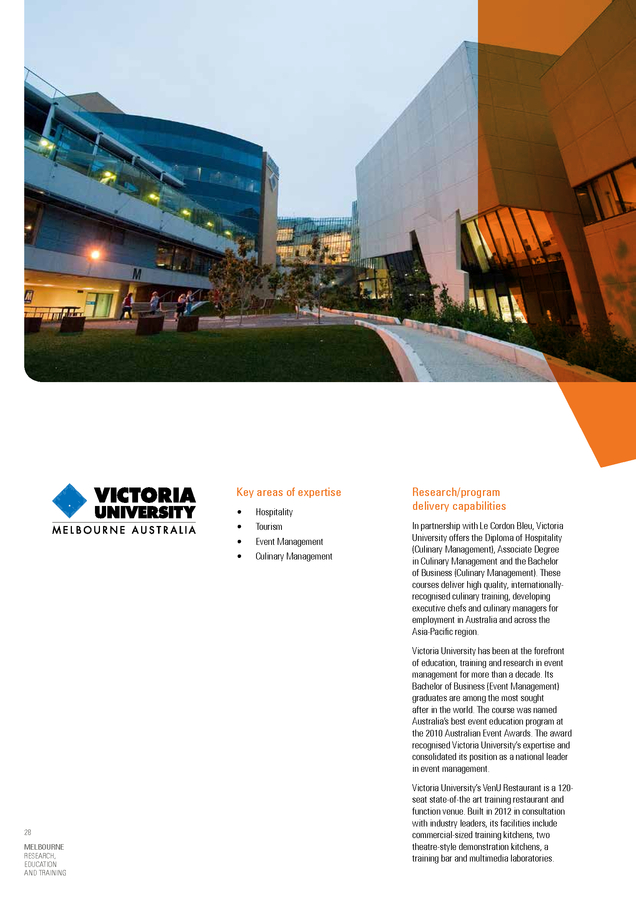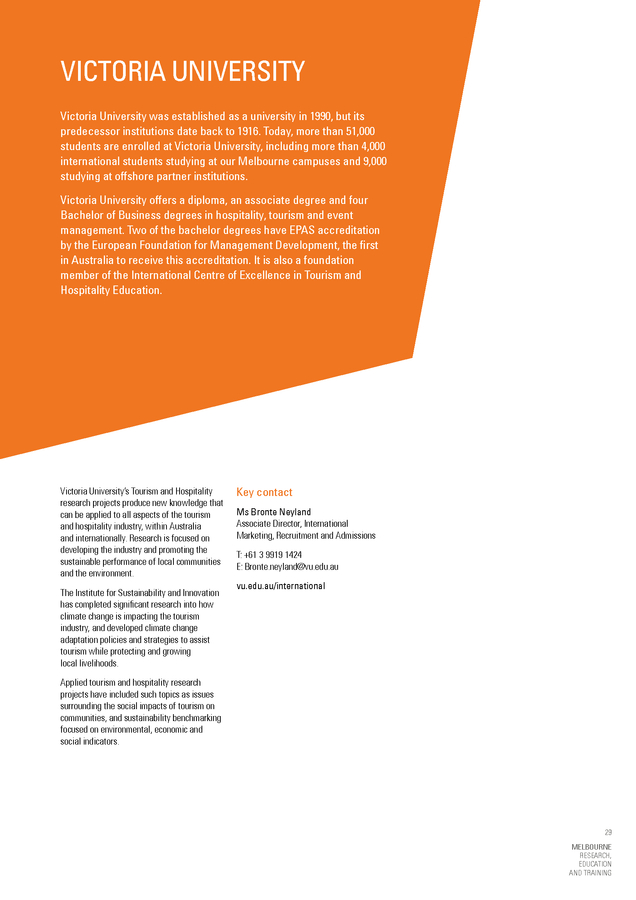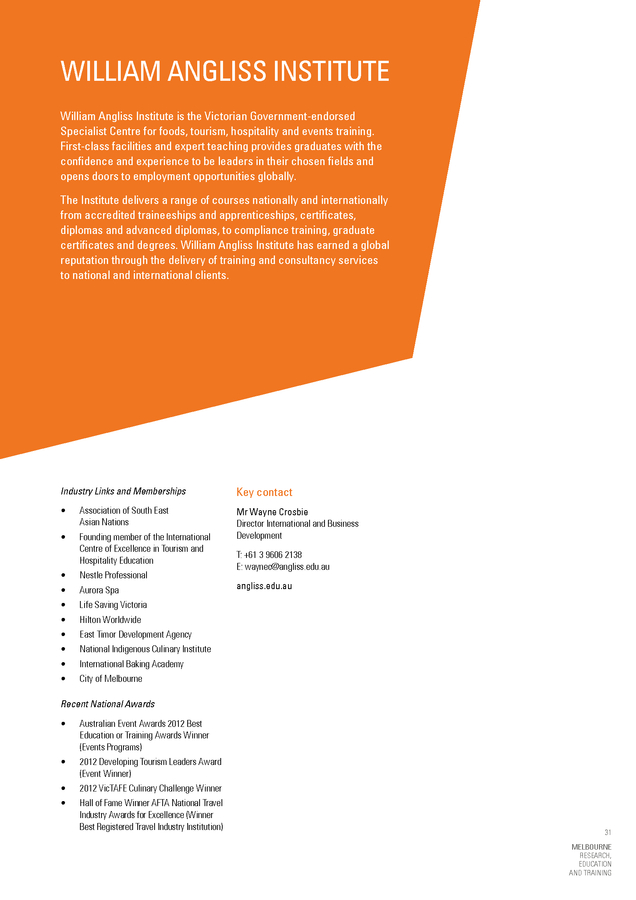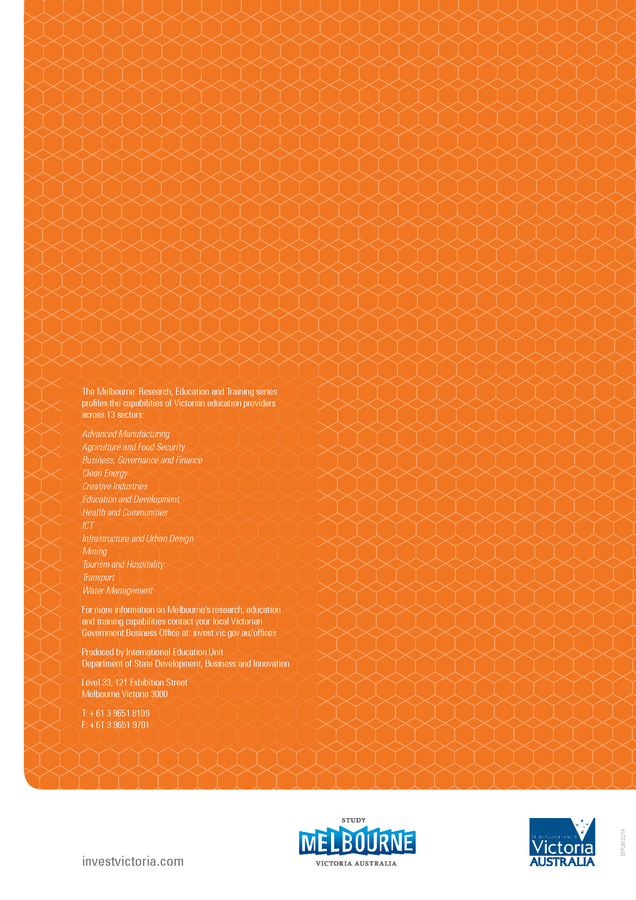




1) MELBOURNE RESEARCH, EDUCATION AND TRAINING TOURISM & HOSPITALITY
2) MELBOURNE: LEADING INNOVATING CONNECTING AUSTRALIA Melbourne VICTORIA
3) Melbourne and regional Victoria are a perfect blend of economic strength and dynamism, with a lifestyle that is envied around the world. Talented people, a world-class education system, supportive government and superior infrastructure make the state of Victoria a global leader in research, education and vocational training. Victoria’s research centres, universities and vocational training providers partner with industry, governments, non-government organisations (NGOs) and other educational institutions around the world. They offer extensive opportunities for partnerships and program collaborations, including joint research initiatives, research and development services, licensing of materials, tailored curriculum development, joint program delivery, staff/student exchange, consultancy services and customised employee development programs. For more information about Victoria’s research, higher education and vocational training capabilities, contact your region’s Victorian Government Business Office at: invest.vic.gov.au/offices. 3 MELBOURNE RESEARCH, EDUCATION AND TRAINING
4) TOURISM AND HOSPITALITY IN MELBOURNE Melbourne and regional Victoria’s sophisticated tourism industry has burgeoned over recent years as a formidable annual calendar of major events and conferences adds to the state’s natural assets and attractions. Melbourne is renowned for its beautiful parks and gardens, superb restaurants, café culture, theatre, music and artistic life. It is also recognised for its strength in providing high quality cultural and sporting experiences that bring high-spending international and domestic tourists in large numbers to the city right across the four seasons. Major events include the Melbourne Cup, Formula One Australian Grand Prix, Australian Open Tennis Championships, the Melbourne International Comedy Festival, Melbourne Food and Wine Festival and Virgin Australia Melbourne Fashion Festival. GOVERNMENT INVESTMENT As tourism is such a significant economic driver for Victoria, the industry has received considerable support from State Government. The Victorian Government’s 2020 Tourism Strategy aims to grow tourism’s contribution to the state’s GSP to approximately A$34 billion by 2020. It identifies four key industry priority strengths driving the continued growth of the state’s tourism industry: • high quality workforce skills training • sophisticated marketing know-how and research • digital excellence • major event and business event tourism. HIGH QUALITY WORKFORCE SKILLS TRAINING In 2013, Melbourne was crowned the world’s most liveable city for the third year in a row by the Economist Intelligence Survey. Melbourne and regional Victoria’s tourism and hospitality industry operates at an extremely high standard, thanks to its highly skilled workforce. Tourism has become an important economic driver for Victoria. In 2011-2012, the direct and indirect contribution of the tourism industry to the Victorian economy was estimated at A$19.1 billion and accounted for approximately 5.8 per cent of Victoria’s Gross State Product (GSP). Across the board, from hotel operations, tour operations, major event management and marketing, to food, wine and hospitality expertise, a highly professional, highly skilled workforce is ensuring Victoria’s tourism, major events and hospitality industries are operating to international first-class standards. This breadth of specialised workforce knowledge is underpinned by Victoria’s universities and vocational training institutes across the gamut of relevant disciplines including professional cookery, resort and hotel management, marketing and eco-tourism. Many of Victoria’s vocational training institutes and dual sector universities provide offshore delivery of their high quality qualifications in partnership with other institutions around the world. They can also assist in the development of courses, curriculums, and accreditation systems and standards. See the Capability Statements of individual institutions at the back of this booklet for more information. 4 MELBOURNE RESEARCH, EDUCATION AND TRAINING
5) MARKETING AND RESEARCH FOOD AND WINE Victoria’s tourism industry is similarly underpinned by the state’s highly sophisticated marketing and research capabilities. Melbourne and Victoria’s food and wine industry is particularly notable for its internationally recognised standards of excellence. It attracts highly skilled professionals from around the world who are keen to improve their skills and professional standing. Victorian universities and vocational training institutes support the growth and sustainability of the state’s tourism industry by providing research in areas such as Consumer Behaviour, Cross Cultural Cognition, Destination Marketing and Competitiveness, Tourism Destination Development and Community Development, Tourism Policy and Planning, Tourist Motivation, International Marketing and Cultural Heritage Development. DIGITAL EXCELLENCE With social media and other new channels playing a growing role in the marketing, planning and purchasing of travel and holidays, the tourism industry needs to ensure it is equipped and trained to maximise the potential of the growing trend towards online research and booking. A number of Victorian institutions provide high-level IT expertise tailored for the needs of the tourism industry. MAJOR EVENTS AND BUSINESS EVENTS Victoria’s long-standing policy of attracting major events and investing in venue development has resulted in an enviable calendar of iconic events positioning Victoria globally and ensuring purposedriven interstate and international visitation that is consistent across the seasons. These include the Formula One Australian Grand Prix, Australian Open Tennis Championships, Melbourne Cup Carnival, Virgin Australia Melbourne Fashion Festival and the Melbourne Food and Wine Festival. As well as sporting and cultural events, Victoria excels in business events, which deliver an economic impact of approximately A$1.2 billion each year at venues such as the Melbourne Convention and Exhibition Centre. Melbourne’s reputation for high quality event and business tourism is underpinned by the high quality of workforce skills and expertise provided by the Victoria’s tourism and hospitality education specialists. Victorian institutions can deliver this high- level expertise to international clients, with assistance in the development of courses, curriculums and accreditation standards, and in providing consulting and support services in the planning, production and delivery of major events. The food capital of Australia, and a great restaurant city, Melbourne is surrounded by a number of key wine regions including the Mornington Peninsula, the Yarra Valley and the King Valley. Their internationally significant vinicultural expertise is matched by the professional standards of hospitality expertise supporting the thriving wine-related tourism of these areas. These and other regional areas have also become increasingly responsible for providing Melbourne’s restaurants with an extraordinarily high quality of primary and valu-added food products. Regional Victoria’s expertise now includes outstanding professional and artisanal knowledge for the production of luxury food products such as heirloom vegetables, rare-breed pork and beef, truffles and artisan cheeses. Melbourne’s food and wine scene has become a core component of Victoria’s thriving tourism and hospitality industry. The annual Melbourne Food and Wine Festival is one of many events cementing Victoria’s prominence as an international food-lover’s destination. MANY OF VICTORIA’S VOCATIONAL TRAINING INSTITUTES AND DUAL SECTOR UNIVERSITIES PROVIDE OFFSHORE DELIVERY OF THEIR HIGH QUALITY QUALIFICATIONS IN PARTNERSHIP WITH OTHER INSTITUTIONS AROUND THE WORLD. 5 MELBOURNE RESEARCH, EDUCATION AND TRAINING
6) CASE STUDY HOSPITALITY TRAINING ON A GRAND SCALE As Macau’s tourism industry prepared for a major expansion, including the opening of the world’s largest casino and the world’s largest Sheraton Hotel, Box Hill Institute ensured over 15,000 hospitality staff were ready. Box Hill Institute (BHI) played a significant role in the successful opening of Macau’s largest integrated hotel and casino resorts by providing project management consultation and leadership for the pre-opening training activities and simulations. The Institute has a Macau office, BHI Macau, providing the growing tourism industry with greater levels of service for project management and training. The Venetian Hotel Resort Macao opened in 2007 and includes a 3,000 suite hotel, the world’s largest casino, 350 premium retail shops and 100,000 square metres of convention and exhibition space. BHI started working with the Venetian management in 2005 to provide training and consultancy services and worked closely with Venetian’s Human Resources Department to train operations staff in time for the August 2007 opening. BHI managed and coordinated training programs, customisation and licensing of resources, and training delivery for 2,000 staff in the areas of Front Office, Housekeeping, Food & Beverage, Stewarding, Train the Trainer and Leadership Development. The project also included a major seven-day simulation exercise with 3,000 non-paying guests designed to prepare hotel employees and systems for the opening of the largest integrated resort and casino in the world. Venetian Macao consequently contracted BHI to support the pre-opening training for their property extension including the Holiday Inn Macao (1,200 rooms), the Conrad Macao (600 rooms), 14 restaurants and a casino. Activity included building the leadership capability of over 400 managers and supervisors, coordinating skills training for 6,500 staff, and managing a 10-day pre-opening simulation. The opening of Sands Cotai Central Phase 1 in April 2012 was recorded as the most successful of all the owners’ properties to date. BHI worked in partnership with the Sheraton Macao to manage the pre-opening simulation for the Sands Cotai Central Phase 2 – the world’s largest Sheraton hotel (4,000 rooms). The 10-day simulation encompassed all hotel operations and casino restaurants to measure guest service delivery and implement training tools and techniques to ensure a guest experience worthy of return. Sheraton Macao opened successfully in September 2012. In 2010-11, BHI was the chosen provider to support the preopening of the Galaxy Macau Resort through delivery of a range of programs and initiatives ranging from train-the-trainer certification, customised technical and leadership skills training and dedicated on-ground support. BHI provided full-time consultancy to the Galaxy Macau Training and Development department 10 months prior to opening, managing all pre-opening gaming and non-gaming training delivery to 7,000 employees for three distinct Brands: Galaxy Macau, Banyan Tree Macau and Hotel Okura Macau. This included the customisation of all hotel operations training materials in Front Office, Food and Beverage and Housekeeping. BHI then planned and managed a two-week fully integrated pre-opening simulation to assess staff skills, three hotel operations systems and procedures and gaming operations with real-time feedback and recommended measures for improvement, prior to the successful opening in April 2011. 6 MELBOURNE RESEARCH, EDUCATION AND TRAINING Photo courtesy of Nattee Chalermtiragool / Shutterstock.com
7) GREEN FUTURES IN BALI Victoria University researchers are helping Indonesia sustainably maximise tourism growth in Bali. Researchers at Victoria University’s Centre for Tourism and Services are working with the Indonesian Government to ensure that growth in tourism on the holiday destination island of Bali is matched by appropriate investment in infrastructure, traffic control, and waste and water management. The research, commissioned by the Indonesian Ministry of Culture and Tourism and released in 2012, proposes actions to increase the sustainability of the tourism sector and maintain the living conditions for residents on the idyllic Indonesian island. Research leader Professor Terry DeLacy says the report shows how Bali could refocus its tourism industry – which represents 40 per cent of its economy – on green growth that balances resident and visitor needs with a sustainable future. The study considered alternative ‘green’ futures to 2050, using demand and capacity forecasts, impact analysis, needs assessments and local surveys. It looked not only at the impact of tourism on Bali’s environment, but also at its effect on community lifestyles, livelihoods and wellbeing – which includes a relatively new measure of Gross National Happiness. A ‘roadmap’ from the study contains dozens of recommendations to support green growth and investment in Balinese tourism, with a focus on waste, water and carbon impacts. “Our approach to alternative futures was designed as a model to help any community or city to understand the positive and negative “OUR APPROACH TO ALTERNATIVE FUTURES WAS DESIGNED AS A MODEL TO HELP ANY COMMUNITY OR CITY TO UNDERSTAND THE POSITIVE AND NEGATIVE POTENTIAL OF TRAVEL AND TOURISM FLOWS ON THEIR ECONOMIES AND THEIR LIFESTYLES.” potential of travel and tourism flows on their economies and their lifestyles,” Professor DeLacy says. “It also takes into consideration new views on the balance of gross national happiness and gross national product.” Professor Geoffrey Lippman, a Victoria University adjunct professor and President of the International Council of Tourism Partners (ICPT), says the potential for jobs, growth and investment in Bali’s tourism sector is dramatic, particularly from the emerging markets of Asia, specifically China. CASE STUDY 7 MELBOURNE RESEARCH, EDUCATION AND TRAINING
8) WILLIAM ANGLISS INSTITUTE HAS PRODUCED 144 ‘TOOLBOXES’ FOR USE THROUGHOUT ALL ASEAN INDUSTRY AND EDUCATIONAL INSTITUTIONS TO ASSIST TRAINERS AND ASSESSORS TO IMPLEMENT THIS CURRICULUM. 8 MELBOURNE RESEARCH, EDUCATION AND TRAINING
9) CASE STUDY Following extensive consultation, William Angliss determined the relevant labour divisions across ASEAN member states and created a common curriculum acceptable to all its members. The product that resulted, funded by Australian aid, was the adoption of a competency-based approach to tourism and hospitality training and a set of 232 common competencies for tourism and hospitality. COORDINATING TOURISM CURRICULUM ACROSS COUNTRIES Melbourne’s William Angliss Institute has played a key role in assisting in the development of a Common ASEAN Tourism Curriculum. Launching in 2015, the ASEAN Economic Community will implement measures to transform ASEAN into a region with free movement of goods, services, investment, skilled labour, and a freer flow of capital. In alignment with this goal, tourism ministers from the ASEAN member states signed a Mutual Recognition Arrangement (MRA) aimed at allowing a freer flow of tourism professionals across borders by mutually recognising each other’s qualifications in tourism and hospitality. Melbourne’s William Angliss Institute has played a key role in assisting in the development of a Common ASEAN Tourism Curriculum. To date, William Angliss Institute has produced 144 ‘toolboxes’ for use throughout all ASEAN industry and educational institutions to assist trainers and assessors to implement this curriculum. A ‘toolbox’ is a set of training resources used to train and assess a particular competency standard. It is composed of a Trainee Manual, a Trainer Guide (with PowerPoint slides and suggested classroom activities to assist trainers in implementing the training) and an Assessment Manual with work projects, oral and written questions and a set of forms and suggestions for the Assessor about alternative methods of assessment. The International Projects team at William Angliss Institute produced the 144 toolboxes in the areas of housekeeping, English language, front office, food and beverage, food production and common competencies. All these toolboxes have gone through an extensive process of verification and approval through numerous national and regional workshops in all ASEAN member states and are now ready for use as part of a qualifications and skills recognition process that William Angliss Institute also developed for ASEAN. Additionally, William Angliss Institute was recently contracted by ASEAN to carry out a gap analysis to determine each ASEAN member state’s readiness to implement the MRA in terms of their hard and soft infrastructure. William Angliss Institute has also assisted ASEAN to determine the feasibility of establishing a Regional Secretariat for Tourism which would provide a focal point for the implementation of the MRA as well as assisting tourism professionals to meet in demand for workers in the hospitality industry among the different member states. 9 MELBOURNE RESEARCH, EDUCATION AND TRAINING
10) CAPABILITY STATEMENTS
11)
12) Key areas of expertise • Certificate II in Kitchen Operations • Certificate III and IV in Commercial Cookery • Certificate III in Patisserie • Diploma of Hospitality The Institute has a focus on international cuisine majoring in French and Italian with a key focus on meeting Australian compliance and licensing and legislative requirements in operating hospitality establishments. 12 MELBOURNE RESEARCH, EDUCATION AND TRAINING Research/program delivery capabilities Academia International has had long-term partnerships with many of Melbourne’s best five-star hotels and fine dining establishments. Its students spend up to two months undertaking training in five-star hotels in addition to utilising our on-campus commercial kitchens, demonstration kitchens, patisserie and bakery, and sugar and chocolate kitchens.
13) ACADEMIA INTERNATIONAL Academia International won the Excellence in International Education: Private Education and Training award at the Victorian International Education Awards 2013 and was the Australian Council for Private Education and Training (ACPET) International Provider of the Year in 2012 and 2013. It is recognised for delivering training in skill shortage areas across the hospitality, personal care, community services, business and commerce, information technlogy and digital arts sectors. Academia International’s English school is a full member of English Australia. Curriculum is developed with an industry and job-ready practicality in mind, utilising the latest industry tools and applications, with project work enabling the student to connect with industry wherever possible. Key contact Mr Mel Koumides Managing Director T: +61 3 9671 4755 E: melk@academia21.com academia21.com 13 MELBOURNE RESEARCH, EDUCATION AND TRAINING
14) Key areas of expertise • • Customised hospitality training programs aligning with brand standards and Standard Operating Procedures Training delivery in food and beverages, sommelier operations, guest and concierge services, butlers, commercial cookery, patisserie, retail baking, hospitality management and kitchen operations • Customised mystery guest program • Service excellence training program • Hotel pre-opening simulation design, training and consultancy Research/program delivery capabilities Program Delivery Box Hill Institute offers a wide range of tourism and hospitality training programs from certificate, diploma and associate degree to bachelor level. Box Hill Institute has demonstrated experience and expertise in delivering training and consultancy services to our industry partners. A selected list of projects undertaken in our key areas of expertise includes: Sands Macao – Mystery Guest program • Venetian Orient Limited – Sands Cotai Central training and consultancy services • Sands Venetian Limited – Venetian Macao Resort Hotel pre-opening training and consultancy services • MELBOURNE RESEARCH, EDUCATION AND TRAINING AusAID – Australia Pacific Technical College School of Tourism and Hospitality • 14 • Galaxy Entertainment Group – Training and consultancy services
15) BOX HILL INSTITUTE Box Hill Institute is a leading Victorian vocational and higher education provider known for a collaborative and creative approach to education in Australia and overseas. Box Hill Institute has been the recipient of many awards and achievements including the coveted Victorian Large Education Provider of the Year 2012, and the International Training Provider of the Year at the Australian Training Awards 2013. Box Hill Institute operates a highly successful Centre for Hospitality and Tourism Studies and has an outstanding record in delivering high quality specialised training programs and consultancy services for the tourism and hospitality industry locally and globally. • Marina Bay Sands Resort – Hotel preopening simulation design, management and training • Per AQUUM – Training and consultancy services for Huvafen Fushi and NIYAMA resorts • Grand Lisboa Hotel Casino – Hotel preopening Superior Guest Services training and intensive train-the-trainers programs • Universal Resorts – Kurumba, Velassaru and Baros Resorts training • Bakers Delight – Retail baking training • Ms Catherine Ng Director, International Projects and Transnational Delivery Crown – Crown Entertainment complex training and consultancy services • Key contact Hunan Foreign Economic Relations and Trade College – Box Hill’s transnational education co-operation partner delivering Australian qualifications including Advanced Diploma in Hospitality. T: +61 3 9286 9997 M: +61 418 171 476 E: c.ng@boxhill.edu.au bhtafe.edu.au 15 MELBOURNE RESEARCH, EDUCATION AND TRAINING
16) DEAKIN UNIVERSITY Key areas of expertise • Commercial Cookery apprenticeships • Front-of-House Food and Beverage traineeships • Tourism traineeships • Hospitality traineeships • Tourism Leadership and Management Research/program delivery capabilities Crown College has been delivering training to tourism and hospitality employees, trainees, and apprentices since 1997, and more than 4,500 students have graduated from Crown College with vocational education and training qualifications. Dedicated training premises include the Culinarium – a fully-equipped training kitchen, bar and restaurant that serves meals and beverages to paying customers and guests attending celebrations and other special events. This is where apprentice chefs watch demonstrations, develop new skills, prepare meals for guests and where trainee food and beverage attendants serve guests. Over the three-year apprenticeship, apprentice chefs split their time between the Culinarium and six, six-monthly rotations in the following Crown outlets: a bakery, a café, a casual restaurant, a premium restaurant, Hotels’ Room Service, and Banquets, giving them unparalleled exposure to multiple cuisines and operations. 16 MELBOURNE RESEARCH, EDUCATION AND TRAINING
17) CROWN COLLEGE Crown College is a Registered Training Organisation (RTO) providing unique and innovative vocational education and training (VET) programs in tourism and hospitality. It also offers leadership and management programs for tourism leaders. Operating in state-of-the-art premises, and employing 70 qualified and industry-experienced trainers, along with specialist managers and administrators, Crown delivers programs that give trainees and apprentices the skills, knowledge and confidence required for a successful career in this industry. Because Crown Melbourne is one of Australia’s most popular tourist destinations, Crown College draws on extensive and real knowledge of what the industry needs, ensuring that programs are practical and relevant. Crown College offers a range of qualifications within the Australian Qualifications Framework at Certificate III, Certificate IV and diploma levels. Crown works closely with producers, including specialist cheese producers, wineries, heirloom orchardists, niche meat producers, fishmongers and many others to ensure that apprentices have a deep understanding of ingredients. Key contacts Crown’s Culinary Ambassadors, worldrenowned chefs Neil Perry and Guillaume Brahimi, personally deliver Masterclasses in the Culinarium and contribute to the curriculum. Mr Jamie Walker Group Training Manager – RTO The College’s culinary trainers and apprentice chefs successfully compete in state, national, and international competitions and actively participate in events that promote tourism and hospitality at a state and national level. Ms Paula Ntalianis Group Training Manager – Hotels, Food and Beverage Mr Shane Thomas Group Manager Learning and Development T: +61 3 9292 8449 E: shanet@crownmelbourne.com.au T: +61 3 9292 8414 E: jamiewalker@crownmelbourne.com.au T: +61 3 9292 8693 E: paulan@crownmelbourne.com.au crowncollege.edu.au 17 MELBOURNE RESEARCH, EDUCATION AND TRAINING
18) DEAKIN UNIVERSITY Key areas of expertise • Hospitality Management • Retail Baking • Commercial Cookery • Patisserie • Events • Travel and Tourism Research/program delivery capabilities Holmesglen is highly experienced in the provision of consultancy services, development and industry projects. Consultancy services include: Teacher training Professional development for staff and managers • Curriculum development • Instructional design – face-to-face, blended and online delivery, workintegrated learning • Advice on facilities and equipment • Quality assurance services • Management of scholarship and fellowship programs • Study tours • MELBOURNE RESEARCH, EDUCATION AND TRAINING Training needs analysis • • 18 • English language training and support.
19) HOLMESGLEN INSTITUTE Holmesglen Institute is a leader in vocational and higher education and one of the largest providers of technical and vocational education and training in Victoria. Holmesglen delivers over 600 courses to nearly 50,000 students. Holmesglen has a strong international profile with an extensive global reach built up from over 20 years of experience in the Asia-Pacific, Gulf States and Middle East regions. International activities range from working with industry clients, government and aid agencies to build the capacity of institutions, systems and staff in the private and public sectors, to collaborative partnerships with educational institutions in the delivery of award programs. The faculty of Hospitality and Tourism can provide customised delivery of workplace-based training and assessment services to a diverse range of organisations. The Institute has a strong quality assurance framework in place so that clients can be assured of high quality outcomes. Holmesglen works with the Guildford Training Centre in Singapore delivering Food and Beverage training and management training to the hospitality industry in Singapore. Key contact Ms Rhonda Edwards Deputy Director – International Business Development T: +61 3 9564 1818 E: Rhonda.Edwards@holmesglen.edu.au holmesglen.edu.au/careers/ hospitality_and_tourism 19 MELBOURNE RESEARCH, EDUCATION AND TRAINING
20) DEAKIN UNIVERSITY Key areas of expertise • Consumer Behaviour • Cross-Cultural Cognition • Destination Marketing and Competitiveness • Film Induced Tourism and Tourism and Media • Tourism Destination Development and Community Development • Tourism Policy and Planning • Tourist Motivations • Wine, Culture, Heritage, Cycle, Battlefield, Festival and Event Tourism Research/program delivery capabilities Tourism and Hospitality Research Unit The Tourism and Hospitality Research Unit draws on over 15 years of tourism and hospitality research. The Unit develops reliable research on the changing nature of tourism and hospitality and its intersection with events in Australia and around the world. Through research, collaborations and publications, the Unit contribute to a global understanding of tourism and hospitality at various social and political levels. The Unit specialises in the theoretical, philosophical, practical and political issues related to tourism, hospitality and events. Film induced tourism and tourism and media La Trobe is a leader in the emerging field of film induced tourism and the relationship between tourism and the media. The University co-convenes the biannual International Tourism and Media conference. 20 MELBOURNE RESEARCH, EDUCATION AND TRAINING
21) LA TROBE UNIVERSITY La Trobe University’s Marketing, Tourism and Hospitality department is a world-leader in research. La Trobe was the only Victorian university awarded ‘at world standard’ in the 2012 Excellence in Research awards in these areas. The Department is home to a highly respected community of researchers who are international leaders in their areas. La Trobe aims to be the place to go for reliable research on the changing nature of tourism and hospitality and its intersection with events in Australia and around the world. Through research, collaborations and publications, the University aims to contribute to a global understanding of tourism and hospitality at various social and political levels. La Trobe specialises in the theoretical, philosophical, practical and political issues related to tourism, hospitality and events. Tourism destination development and community development Wine, culture, heritage, cycle, battlefield, festival and event tourism Research draws on a range of disciplines to investigate issues surrounding tourism and hospitality in the public, not-forprofit and corporate sectors and their impact on community development through destination development. La Trobe has a number of academics specialising in Culture, Heritage, Cycle, Battlefield, Festival and Event Tourism and their sub areas; rail trails, dark tourism, gastronomy, dance tourism and the effects of climate change on tourism and nature tourism. Key contact Dr Elspeth Frew Associate Professor, Head of Department (Marketing, Tourism and Hospitality) T: +61 3 9479 2333 E: e.frew@latrobe.edu.au latrobe.edu.au Tourism policy and planning La Trobe’s academics are renowned and well published in the specialisation of tourism policy and planning, looking at the effects on the tourism industry of policy and economic decision-making and the role of government within the contemporary market system. Tourist motivations The study of tourist motivations involves the study of psychological factors that motivate and influence selection. 21 MELBOURNE RESEARCH, EDUCATION AND TRAINING
22) Key areas of expertise • The contemporary and ongoing industry experience of our academic staff • Strategic integration of the course with the tourism industry in Australia and internationally Strong links between innovative research and teaching: • An international focus across the program • The opportunity for all students to participate in industry fieldwork as part of their studies. Research/program delivery capabilities Monash’s academic staff members are widely regarded as research pioneers in the field of high-yield, independent travel/backpacker travel and the associated impacts on urban tourism and the development of small and medium-size enterprises. Its programs and research have a strong focus on building sustainable tourism development in emerging economies. Programs feature industry internships and an industry-focused international field school unit in Fiji, Vietnam or another destination with industry guest speakers in association with the School of Oriental and African Studies (SOAS), University of London. artsonline.monash.edu.au/master-tourism/ teaching-and-learning/ 22 MELBOURNE RESEARCH, EDUCATION AND TRAINING
23) MONASH UNIVERSITY Monash University has become the largest university in Australia, renowned for outstanding teaching, transformative research, international reach and extensive alumni network. Monash is a global university possessing the ambition and ability to address momentous global challenges. Monash has campuses in Australia, Malaysia and South Africa and major partnerships with universities in China, India and the United Kingdom. At Monash, Tourism and Hospitality studies are most prevalent in the Master of Tourism. The Master of Tourism coursework degree engages with industry at all levels, is based on research into emerging tourism fields and is designed to prepare students for an international career in tourism management. This masters degree equips students with skills and expertise in marketing and international marketing, environmental studies, information technology, cultural heritage studies and development, special events, and planning. Coursework is complemented by the Australian International Tourism Research Unit (AITRU) based at Monash. AITRU conducts tourism research domestically and internationally. Key contact Dr Jeff Jarvis Faculty of Arts T: +61 3 9903 4036 E: Jeff.Jarvis@monash.edu monash.edu.au 23 MELBOURNE RESEARCH, EDUCATION AND TRAINING
24) Key areas of expertise • Practical, supervisory and management training for hotels, clubs, restaurants, corporate caterers, event management companies Research/program delivery capabilities NMIT runs an extensive range of courses in commercial cookery, bakery, hospitality, tourism, travel and events. NMIT’s training involves active participation in major events and projects, with industry bodies and associations, to provide students with industry-based learning experiences. Its state-of-the-art facilities are purpose-built to offer sophisticated training environments and equipped with the latest industry technologies including six commercially-equipped kitchens, a fully functional production kitchen and other specialty kitchens. 24 MELBOURNE RESEARCH, EDUCATION AND TRAINING NMIT operates two fully commercial food and beverage outlets – the award-winning St Georges restaurant and a 40-seat bistro. NMIT teachers are experienced and current practitioners from all sectors of the hospitality and tourism industries. St Georges restaurant was awarded the Best Restaurant in Training Institute at the Victorian state final of the 2012 Savour Australia Restaurant and Catering HOSTPLUS Awards for Excellence. The hospitality program is being extended to the Melbourne Polytechnic campus in 2014.
25) NMIT NMIT’s Hospitality and Tourism Department operates from purposebuilt training centres. The delivery of courses is based on industry advice. Commercial Cookery Programs range from Pre-apprenticeship, Apprenticeship, Certificate II in Hospitality (Kitchen Operations), Certificate III in Hospitality (Commercial Cookery) and Certificate III in Hospitality (Patisserie), and these can articulate through to the Diploma or Advanced Diploma of Hospitality Management. Hospitality programs include a diverse mix of course offerings which are aimed at the different employment sectors within the industry including supervisory and management training for employment within hotels, clubs, restaurants, corporate caterers and event management companies. NMIT’s Bachelor of Hospitality Management provides an academic program with extensive content and theory for ‘real-world’ industry projects. This practical experience is applied to all levels within the degree program. NMIT delivers a range of programs in hospitality and personal services, from certificate to diploma level qualifications, in China and South Korea. nmit.edu.au/departments/ hospitality_and_tourism nmit.edu.au/departments/hospitality Key contact Mr Timothy Gilbert Manager International Programs, International Office T: +61 3 9269 1666 E: timgilbert@nmit.edu.au nmit.edu.au 25 MELBOURNE RESEARCH, EDUCATION AND TRAINING
26) Key areas of expertise • Retail travel and reservations • Travel and tourism sales, marketing and operational skills • Event management processes and coordination – festivals, conferences, events Research/program delivery capabilities South West TAFE has a proven track record of achievement in providing innovative and high quality education and training in Australia and internationally. South West TAFE continually evolves its courses to meet current industry and market demands. The Institute delivers highly recognised industry courses and provides students with state-of-the-art equipment and facilities including an onsite fully-equipped commercial kitchen and an operational training restaurant. South West TAFE is a preferred provider to various industries including tourism and event management and is privy to a range of international opportunities due to its geographical location on the internationally renowned Great Ocean Road. South West TAFE has links with international hotels and internationally recognised festivals which provides its students with practical training and experience. 26 MELBOURNE RESEARCH, EDUCATION AND TRAINING
27) SOUTH WEST TAFE South West TAFE has a long history of providing vocational education and training for tourism and hospitality industries domestically and internationally. It specialises in providing students with skills in tourism, event management and managerial skills to coordinate tourism and travel operations. South West TAFE is a multi-campus institute in south-west Victoria and is the largest provider of vocational education and training in the region with approximately 14,000 enrolments annually. South West TAFE has provided industry-recognised training solutions including customised skill-based and nationally-accredited and non-accredited training for more than 150 years. South West TAFE has provided offshore programs since 1994 and is recognised for its international delivery and quality service. It continues to expand its capacity to offer relevant international education and training. A range of flexible delivery models ensures students can access our services wherever they are based worldwide. South West TAFE’s international offerings include certificate to diploma level and it has fostered close links with various industries to ensure the direction and delivery of its teaching complies with current and future industry requirements. During the past 20 years the Institute has worked in China, Malaysia, Fiji, Samoa and the Philippines to deliver a diverse range of courses. Key contact Mr John Cook Industry Relationships Manager T: +61 3 5564 8943 M: +61 419 007 276 E: John.cook@swtafe.vic.edu.au swtafe.vic.edu.au South West TAFE has secured a number of international agreements with companies recognised for excellence in training including Woolworths, GlaxoSmithKline and Alcoa. These agreements have helped South West TAFE to develop and deliver diverse learning opportunities abroad. South West TAFE’s experienced staff provide effective responses to international delivery requirements and ensure clients’ needs are met with culturally appropriate communication strategies. 27 MELBOURNE RESEARCH, EDUCATION AND TRAINING
28) Key areas of expertise • Hospitality • Tourism • Event Management • Culinary Management Research/program delivery capabilities In partnership with Le Cordon Bleu, Victoria University offers the Diploma of Hospitality (Culinary Management), Associate Degree in Culinary Management and the Bachelor of Business (Culinary Management). These courses deliver high quality, internationallyrecognised culinary training, developing executive chefs and culinary managers for employment in Australia and across the Asia-Pacific region. Victoria University has been at the forefront of education, training and research in event management for more than a decade. Its Bachelor of Business (Event Management) graduates are among the most sought after in the world. The course was named Australia’s best event education program at the 2010 Australian Event Awards. The award recognised Victoria University’s expertise and consolidated its position as a national leader in event management. 28 MELBOURNE RESEARCH, EDUCATION AND TRAINING Victoria University’s VenU Restaurant is a 120seat state-of-the art training restaurant and function venue. Built in 2012 in consultation with industry leaders, its facilities include commercial-sized training kitchens, two theatre-style demonstration kitchens, a training bar and multimedia laboratories.
29) VICTORIA UNIVERSITY Victoria University was established as a university in 1990, but its predecessor institutions date back to 1916. Today, more than 51,000 students are enrolled at Victoria University, including more than 4,000 international students studying at our Melbourne campuses and 9,000 studying at offshore partner institutions. Victoria University offers a diploma, an associate degree and four Bachelor of Business degrees in hospitality, tourism and event management. Two of the bachelor degrees have EPAS accreditation by the European Foundation for Management Development, the first in Australia to receive this accreditation. It is also a foundation member of the International Centre of Excellence in Tourism and Hospitality Education. Victoria University’s Tourism and Hospitality research projects produce new knowledge that can be applied to all aspects of the tourism and hospitality industry, within Australia and internationally. Research is focused on developing the industry and promoting the sustainable performance of local communities and the environment. The Institute for Sustainability and Innovation has completed significant research into how climate change is impacting the tourism industry, and developed climate change adaptation policies and strategies to assist tourism while protecting and growing local livelihoods. Key contact Ms Bronte Neyland Associate Director, International Marketing, Recruitment and Admissions T: +61 3 9919 1424 E: Bronte.neyland@vu.edu.au vu.edu.au/international Applied tourism and hospitality research projects have included such topics as issues surrounding the social impacts of tourism on communities, and sustainability benchmarking focused on environmental, economic and social indicators. 29 MELBOURNE RESEARCH, EDUCATION AND TRAINING
30) Key areas of expertise • Culinary Arts (Cooking, Patisserie, Food Science and Confectionary, Baking) • Hospitality and Business Management • Tourism, Travel and Events • Industry Compliance Research/program delivery capabilities William Angliss Institute’s main campus is located in the heart of Melbourne. The campus offers industry-standard training facilities including simulated and live training restaurants and cafes, bakery and training spa. A second Australian campus is based in Sydney. Accredited Tourism and Hospitality certificate programs are delivered through joint venture partner institutes in China, including Shanghai University, Nanjing Institute of Tourism and Hospitality, Zhejiang Tourism College (Hangzhou) and Nankai university (Tianjin). William Angliss Institute has international partner campuses at Berjaya University College of Hospitality in Malaysia, Dusit Thani College in Thailand and the Colombo Academy of Hospitality Management and Sri Lanka Institute of Information Technology in Sri Lanka. 30 MELBOURNE RESEARCH, EDUCATION AND TRAINING
31) WILLIAM ANGLISS INSTITUTE William Angliss Institute is the Victorian Government-endorsed Specialist Centre for foods, tourism, hospitality and events training. First-class facilities and expert teaching provides graduates with the confidence and experience to be leaders in their chosen fields and opens doors to employment opportunities globally. The Institute delivers a range of courses nationally and internationally from accredited traineeships and apprenticeships, certificates, diplomas and advanced diplomas, to compliance training, graduate certificates and degrees. William Angliss Institute has earned a global reputation through the delivery of training and consultancy services to national and international clients. Industry Links and Memberships Key contact • Association of South East Asian Nations • Founding member of the International Centre of Excellence in Tourism and Hospitality Education Mr Wayne Crosbie Director International and Business Development • Nestle Professional • Aurora Spa • Life Saving Victoria • Hilton Worldwide • East Timor Development Agency • National Indigenous Culinary Institute • International Baking Academy • T: +61 3 9606 2138 E: waynec@angliss.edu.au City of Melbourne angliss.edu.au Recent National Awards • Australian Event Awards 2012 Best Education or Training Awards Winner (Events Programs) • 2012 Developing Tourism Leaders Award (Event Winner) • 2012 VicTAFE Culinary Challenge Winner • Hall of Fame Winner AFTA National Travel Industry Awards for Excellence (Winner Best Registered Travel Industry Institution) 31 MELBOURNE RESEARCH, EDUCATION AND TRAINING
32) The Melbourne: Research, Education and Training series profiles the capabilities of Victorian education providers across 13 sectors: Advanced Manufacturing Agriculture and Food Security Business, Governance and Finance Clean Energy Creative Industries Education and Development Health and Communities ICT Infrastructure and Urban Design Mining Tourism and Hospitality Transport Water Management For more information on Melbourne’s research, education and training capabilities contact your local Victorian Government Business Office at: invest.vic.gov.au/offices Produced by International Education Unit Department of State Development, Business and Innovation Level 33, 121 Exhibition Street Melbourne Victoria 3000 investvictoria.com DTPLI8132/14 T: + 61 3 9651 8109 F: + 61 3 9651 9701


